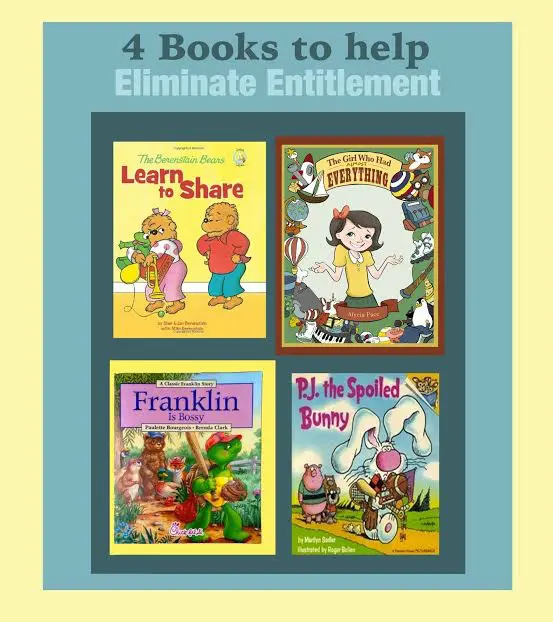Raising a child has never been a small feat. And the world today is saturated with technology and toys and endless gadgets all competing for the attention of your little ones. As a parent, your kids mean the world to you, so it’s only natural to want to give, give, give. While your children may feel loved initially when we buy them things, little by little the feeling wears off and they are left wanting more and more. Are you stuck in the vicious cycle and wondering how to overcome entitlement attitude? This article has some helpful ideas for dealing with entitled kids and helping them shift to an attitude of gratitude. We also include some suggestions for books on entitlement that may help reach a spoiled child.

Entitlement Meaning
Oxford Languages provides the entitlement definition as, “the belief that one is inherently deserving of privileges or special treatment”. Do you remember Veruca Salt from Willy Wonka and the Chocolate Factory? She had all the signs of an entitled, spoiled child and it was clear what the Roald Dahl thought of her character! Let’s face it. Entitled people (adults or children) are just annoying. You are not doing your child any favors if you let them get away with that kind of behavior much less if you cater to it!
The younger generations seem to suffer from entitlement more and more. First, there has been a societal change to where every kid gets a participation trophy. This is true figuratively in many ways as well. Parents seem to have an automatic mindset that if something is wrong at school, it is the teacher, not the child. However, the mere fact that the child showed up does not mean they deserve an A.
Couple this societal change in values with the technological changes and it seems to make for a real doozy with entitlement in children. Social media is pervasive in the lives of our children these days and it basically trains them into a “it’s all about me” mindset. They need the likes, comments, and general attention to feel fine. Therefore, they must have and do what it takes to get that. Kids of all ages feel that deserve whatever it takes and after all, everyone else on social media has it.
How To Deal With Entitled Children
Not to worry. There are plenty of ways to get your little tikes out of the selfish entitlement mindset. You may want to do some reading of entitlement books to get a good idea of the whole cycle and how our own behavior can contribute to a sense of entitlement. You may also want to keep tabs on their social media usage and talk to your kids about having an attitude of gratitude. Saying “no” to their requests is not always a bad thing.
Remember, it’s crucial to find a balance between providing love and support and instilling discipline and responsibility. Parenting involves setting boundaries, teaching life skills, and fostering a healthy sense of self-worth. Encourage the child to take responsibility for their actions and contribute to household chores and responsibilities. Clearly define and enforce rules and boundaries to teach the child about limits and consequences.
It will take some time, but just a few minutes a day of one-on-one attention can help. One way to not only give them the personalized attention they need, but also raise their vision to a happier way of life, is reading them uplifting stories. Search for stories that teach good lessons. Let’s look at four excellent children’s books that’ll help combat that pesky entitlement attitude and help your kids learn healthier habits like sharing and playing with friends.
4 Children’s Books On Entitlement:
A spoiled child is typically one who has been excessively indulged, often to the point where they display entitled and demanding behavior. Spoiling a child can occur when parents or caregivers excessively cater to their every desire, shield them from consequences, and fail to establish appropriate boundaries. Children’s books about being spoiled may allow them to see thing from a new perspective. These books about entitlement will give your children a first hand look at how that attitude is negative for both themselves and others. They are a great way to prevent entitlement.
P.J. The Spoiled Bunny
P.J. was a selfish bunny who only wanted to do what he wanted to do instead of what his friends did. His self-centeredness leads him to lose some good experiences with his friends. Eventually, however, P.J. realizes that he will be happier if he thinks of others first and decides that he doesn’t always have to have it his way to find joy and fulfillment. Here is my affiliate link to P.J. The Spoiled Bunny.
Above is a fun stop motion homemade telling of the story.
The Berenstain Bears Learn to Share
Sister Bear enjoys playing with her own toys, but doesn’t want to share them with anyone. Her mother tells her to share. With some introspection, she realizes that sharing makes everything more fun. She shares not only her toys, but also her friendship and her time. Along with teaching kids to share, this story also teaches some strong Christian values. Here is my affiliate link to The Berenstain Bears Learn to Share.
Above is a cute video of a dad reading the book to his children.
The Girl Who Had Almost Everything
Colette is a young girl who wants more and more toys. She continually begs her parents for additional toys. Though she has a mountain of toys, she soon realizes that her toys don’t make her happy. Colette has no one to play with, so she feels very empty. Once she focuses on what she can do to help other people, she finds the happiness she has always been looking for. In short, Colette discovers that true happiness comes not from receiving, but from giving.
This book is currently available on Amazon. To order your copy though my affiliate link, click here.
Franklin is Bossy
Franklin the turtle always wants to get his way. He orders his friends to do exactly what he wants. In short, Franklin is bossy and impatient. As he becomes more and more bossy, his friends don’t want to play with him because he isn’t fun to be around. After a few days of playing alone, Franklin realizes that he will have more fun with his friends if he isn’t bossy. He apologizes and has fun playing with his friends again. Here is my affliliate link to it on Amazon.
5 Books About Entitlement For Adults
Here are 5 insightful books about entitlement, covering various aspects like parenting, culture, psychology, and personal growth:
1. The Entitlement Cure by Dr. John Townsend
A practical and Christian-based approach to overcoming the mindset of entitlement by building character, responsibility, and resilience.
Focus: Personal development, Christian living, psychology
Good for: Individuals struggling with or parenting through entitlement issues
2. Generation Me by Jean M. Twenge
Examines how cultural shifts have fostered self-focus and entitlement in younger generations, with research-backed insights into the “Me Generation.”
Focus: Sociology, generational psychology
Good for: Understanding cultural trends and generational behavior
3. The Narcissism Epidemic: Living in the Age of Entitlement by Jean M. Twenge & W. Keith Campbell
Explores the rise of narcissism and entitlement in modern society and the consequences it brings to relationships, work, and communities.
Focus: Cultural analysis, psychology
Good for: Anyone wanting a deep dive into cultural entitlement
4. How to Raise an Adult by Julie Lythcott-Haims
A compelling guide for parents to help kids develop independence and avoid raising entitled children.
Focus: Parenting, education
Good for: Parents, educators, and caregivers
5. The Price of Privilege by Madeline Levine
Highlights how affluent kids, often given too much and expected to be high achievers, suffer from entitlement and emotional struggles.
Focus: Parenting, psychology
Good for: Parents in affluent communities or professionals working with teens
Conclusion
No one wants to raise an entitled child. Reading to children is an excellent activity, but sadly it has become less common in today’s media-heavy world. Take some time today to read or listen to one of these books on entitlement with your kids. Bonding time and good lessons to overcome entitlement attitude await! Remember, they don’t need more presents. They need more presence.
Furthermore, when addressing spoiled behavior, try to help your child understand and consider the feelings and needs of others. Demonstrate appropriate behavior, gratitude, and resilience in the face of challenges. And most importantly, allow the child to make age-appropriate decisions and face the consequences of those decisions. Finally, do not use material possessions as the primary means of expressing love or approval. A change in your attitude will help create a shift in their attitude as well as they find their safety net no longer shields them from the results of their own behavior.
The Importance Of Family Values

